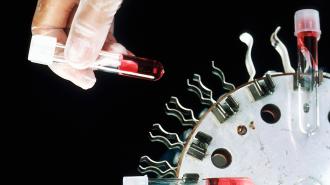A new cancer therapy developed at Jerusalem’s Hadassah-University Medical Center had a 90% response rate in a new clinical trial, with over half of patients going into total remission. The CAR-T therapy — which arms the body’s own immune cells to fight cancer — was able to send multiple myeloma, an extremely deadly cancer that impacts the immune system, into remission.
The therapy is the result of years worth of experiments conducted by the hospital’s bone-marrow transplant and immunotherapy department, the Jerusalem Post reported.
“We have evidence of a very positive overall response rate with minimal side effects, and they are mild,” Polina Stepensky, the head of the bone marrow transplantation and cancer immunotherapy department, told the Jerusalem Post.
“These are dramatic results. This is a huge hope for patients with a disease that has not yet had a cure.”
A new CAR-T therapy for multiple myeloma had a 90% response rate in a clinical trial.
What is multiple myeloma? Multiple myeloma is a rare but deadly blood cancer, stemming from a kind of white blood cell called plasma cells. Normally, these cells reside in the bone marrow, cranking out antibodies to help fight infection. But cancerous plasma cells are a serious threat.
The malignant cells begin producing abnormal antibodies that do not fight infection, while also elbowing out blood-forming cells in the marrow, impacting your ability to create enough healthy red blood cells and platelets (the little fellas charged with forming clots to staunch or slow bleeding).
This blood cancer causes anemia; bone pain and fracture risk; kidney problems (stemming from those junk antibodies clogging up the organ’s filters); blood thickening, making it harder to pump blood effectively; and susceptibility to infection.
According to government estimates, about 35,000 people will develop myeloma in the US this year and about 12,500 will die from it.
Starting the CAR: Stepensky was inspired to work on a CAR-T therapy for multiple myeloma after seeing the treatment in action at New York’s Memorial Sloan Kettering Cancer Center in 2017, Hadassah Magazine reported.
“When I graduated from Hadassah Medical School in 1998, median survival for multiple myeloma patients was less than three years,” Stepensky told the magazine. “With new medications and bone marrow transplantation, we’ve stretched this to over a decade. But in the end, all existing therapies lose effectiveness. We needed another approach.”
“These are dramatic results. This is a huge hope for patients with a disease that has not yet had a cure.”
Polina Stepensky
CAR-T seemed to be that approach. In CAR-T therapy, the patient’s T cells — a different kind of white blood cell — are extracted and given “chimeric antigen receptors,” or CARs. The CAR allows the T cell to spot the cancerous cells and go on the attack.
Stepensky teamed up with Bar-Ilan University immunologist Cyrille J. Cohen to develop a specific CAR protein target to fight multiple myeloma.
“It took many different designs until we identified the optimum molecule, but we got there,” Cohen told Hadassah Magazine.
The trial: In their newest trial, 74 multiple myeloma patients received the CAR-T therapy. Over half of the patients went into complete remission, Israel21C reported, with 90% responding to the therapy.
There are now over 200 patients from across the globe on waiting lists for the therapy, which is still only conducted as a trial. Because of the therapy’s complexity, only one patient can enter treatment per week, Stepansky said.
US-based IMMX Bio has a patent license for the therapy, with a US trial slated to start soon, Stepansky said. The hope is to have the treatment approved by the FDA within a year.
We’d love to hear from you! If you have a comment about this article or if you have a tip for a future Freethink story, please email us at [email protected].






